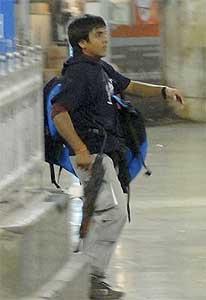Source :Wikipedia
In November 2008, 10 Pakistani members ofLashkar-e-Taiba, an Islamic militantorganisation, carried out a series of 12 coordinated shooting and bombing attacks lasting four days across Mumbai.The attacks, which drew widespread global condemnation, began on Wednesday, 26 November and lasted until Saturday, 29 November 2008, killing 164 people and wounding at least 308.
Eight of the attacks occurred in South Mumbai: at Chhatrapati Shivaji Terminus, theOberoi Trident, the Taj Mahal Palace & Tower, Leopold Cafe, Cama Hospital,] theNariman House Jewish community centre,the Metro Cinema,and in a lane behind theTimes of India building and St. Xavier's College.There was also an explosion atMazagaon, in Mumbai's port area, and in a taxi at Vile Parle. By the early morning of 28 November, all sites except for the Taj hotel had been secured by Mumbai Police and security forces. On 29 November, India'sNational Security Guards (NSG) conducted 'Operation Black Tornado' to flush out the remaining attackers; it resulted in the deaths of the last remaining attackers at the Taj hotel and ending all fighting in the attacks.
According to Maharashtra chief ministerVilasrao Deshmukh, 15 policemen and twoNSG commandos were killed, including the following officers:
- Assistant Police Sub-Inspector Tukaram Omble,who succeeded in capturing a terrorist alive, with his bare hands.
- Joint Commissioner of Police Hemant Karkare, the Chief of the Mumbai Anti-Terrorism Squad
- Additional Commissioner of Police: Ashok Kamte
- Encounter specialist Senior Inspector Vijay Salaskar
- Senior Inspector Shashank Shinde
- NSG Commando, Major Sandeep Unnikrishnan
- NSG Commando, Hawaldar Gajendra Singh
Kasab's trial was delayed due to legal issues, as many Indian lawyers were unwilling to represent him. A Mumbai Bar Association passed a resolution proclaiming that none of its members would represent Kasab. However, the Chief Justice of India stated that Kasab needed a lawyer for a fair trial. A lawyer for Kasab was eventually found, but was replaced due to a conflict of interest. On 25 February 2009, Indian investigators filed an 11,000-page chargesheet, formally charging Kasab with murder, conspiracy, and waging war against India among other charges.
Kasab's trial began on 6 May 2009. He initially pleaded not guilty, but later admitted his guilt on 20 July 2009. He initially apologised for the attacks and claimed that he deserved the death penalty for his crimes, but later retracted these claims, saying that he had been tortured by police to force his confession, and that he had been arrested while roaming the beach. The court had accepted his plea, but due to the lack of completeness within his admittance, the judge had deemed that many of the 86 charges were not addressed and therefore the trial continued.
Kasab was convicted of all 86 charges on 3 May 2010. He was found guilty of murder for directly killing seven people, conspiracy to commit murder for the deaths of the 164 people killed in the three-day terror siege, waging war against India, causing terror, and of conspiracy to murder two high-ranking police officers. On 6 May 2010, he was sentenced to death by hanging.However, he appealed his sentence at high court. On 21 February 2011, the Bombay High Court upheld the death sentence of Kasab, dismissing his appeal.
On 29 August 2012, the Indian Supreme Court upheld the death sentence for Kasab. The court stated, "We are left with no option but to award death penalty. The primary and foremost offence committed by Kasab is waging war against the Government of India.”The verdict followed 10 weeks of appeal hearings, and was decided by a two-judge Supreme Court panel, which was led by Judge Aftab Alam. The panel rejected arguments that Kasab was denied a free and fair trial.
Kasab filed a mercy petition with the President of India, which was rejected on 5 November . Kasab was hanged in Pune's Yerwada jail in secret on 21 November 2012 at 7:30 am and naming the operation as operation 'X'. The Indian mission in Islamabad informed the Pakistan government about Kasab's hanging through letter. Pakistan refused to take the letter, which was then faxed to them. His family in Pakistan was sent news of his hanging via a courier.

